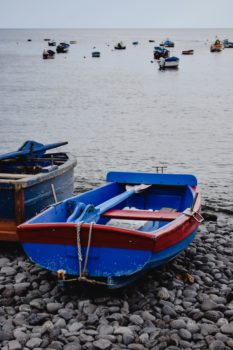The Kolis Posted by Nicole Herbert Dean on Jun 9, 2021 in Food, History
A short distance दूरी from the house I grew up in, is a little fishing village गाँव called Danda Koliwada. The village is so close that every afternoon दोपहर the smell of drying fish मछली comes wafting into the open windows खुली खिड़कियाँ of my home. The Kolis, as these fisherfolk मछुआरों are called dry Bombay Duck, a fish really, on nylon lines along the sea wall समुद्र की दीवार. Bombay Duck is a delicacy विनम्रता in Mumbai, eaten best fried in a crispy batter.
Origins of the Kolis
The Kolis are some of the oldest inhabitants निवासियों of Mumbai. They originally come from the coastlines तटीयरेखाओं of Maharashtra, Gujarat and Rajasthan. The Kolis were originally ethnic संजाति विषयक Marathis that settled along the west coast संजाति विषयक of Maharashtra. With the advent of the British and then the Portuguese, many converted परिवर्तित to Christianity. The rest remained Hindu but divided into many sects.
Koliwada
These fisherfolk live in Koliwadas which translates roughly, ‘house that opens to the sea’. There are many Koliwadas in Mumbai. Danda Koliwada, Sion Koliwada, Worli and Colaba Koliwada.
Kolis basically developed विकसित the coastlines with their industry. They fish in usually wooden or fiberglass trawlers. They consider the sea, their father, and the boat their mother. Each family spends about 20-25 lakhs on a boat, which is a huge investment निवेश.
Festivals and Food
A large festival called Narali Punav signals the onset of the season that is favorable to fishing. The Kolis offer prayers प्रार्थना at their temples and boats are treated as sacred धार्मिक with the breaking of coconuts.
Currently during this season, one of the larger Koli communities धार्मिक in Versova holds a large seafood festival त्यौहार for the general public to showcase प्रदर्शन the catch of the day. The seafood they catch, fish, prawns झींगे, mussels शंबुक, clams, crabs केकड़ा, lobster, etc usually go to service the various restaurants in the cities and also their tables. Being mostly Hindu they do eat seafood even though meat is generally not allowed.
They love to haggle
Kolis are a vibrant community. They love to haggle झंझट करना with their customers but at the same time are very generous उदार to their loyal ones. I remember a Koli woman coming to our door with a basket of fish and other seafood on ice. She would haggle with my father on the price कीमत of fish. Much drama and arguing बहस would ensue but in the end, she would wrap the fish in a newspaper and hand it over.
Traditionally पारंपरिक रूप से the men would go fishing and the women would sell the fish. They carried the fish on ice in large baskets टोकरी on the top of their heads. These women traveled by train, usually in the luggage सामान compartment to towns nearby. Rarely they would board the ladies compartment on the local train.
Urban stories have it that it is wise not to get into an argument बहस over space on the train with a Koli, or they would ‘accidentally’ pour fishwater on you. Other than that, they are a loving community that adds a delightful रमणीय flavor to the city of Mumbai.

Build vocabulary, practice pronunciation, and more with Transparent Language Online. Available anytime, anywhere, on any device.




